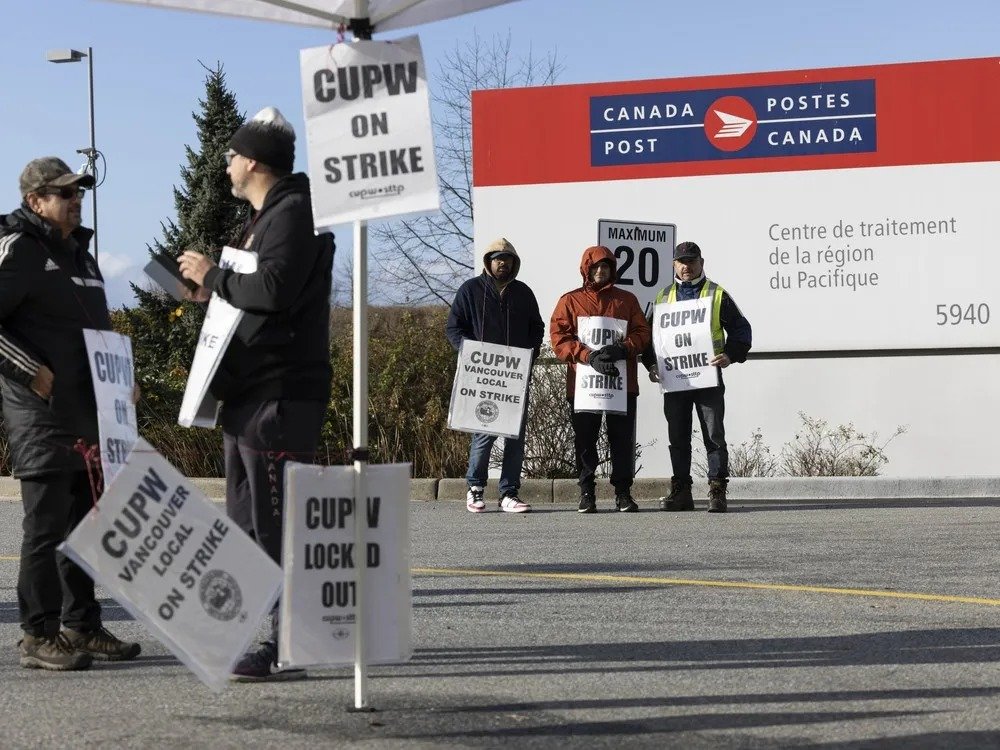Canada Post Strike: News is spreading rapidly across Canada that the employees of Canada Post may soon go on strike. This news is of greatest concern to those who depend on the pension and other financial assistance received from the government every month, especially our senior citizens.
Many people are thinking:
- “If the postal service stops, how will my pension come?”
- “Will I be able to pay my rent and bills on time?”
- “Will I face problems in paying for my medicines?”
If you are also thinking the same, then you are absolutely right. In this article, we will tell you in detail what impact this possible strike can have and what steps you can take right now so that your income remains safe and you do not face any financial difficulties.
Why is the postal service so important?
Even though many things have become online in today’s digital age, even today thousands of senior citizens in Canada receive pension cheques by post every month.
Many of those who rely on government benefits such as the Canada Pension Plan (CPP), Old Age Security (OAS) and Guaranteed Income Supplement (GIS) still receive payments via paper cheques.
If postal workers go on strike and the postal service stops, there is bound to be a delay in receiving the cheque.
Possible effects of the strike
If the postal service is disrupted, it can have several effects:
- Not getting pension or benefit cheques on time
- Delay in rent and bill payments
- Shortage of money for medicines
- If the necessary documents for benefits such as GIS are not sent on time, payments may be stopped
- Seniors whose pension is their main or only source of income can face a serious financial crisis
What should senior citizens do?
Now the question arises that what can senior citizens do in this situation so that their life is not affected. The good news is that with some simple steps you can avoid this situation.
1. Register for direct deposit
The government offers direct deposit for all benefits. If you start receiving your pension through direct deposit, the money is sent directly to your bank account, eliminating the need to rely on the postal service.
There are 3 easy ways to connect to direct deposit:
- Online: Log in to My Service Canada Account and update your bank details.
- By phone: You can also register by calling 1-800-277-9914.
- Through your bank: Most Canadian banks (such as RBC, TD, CIBC, BMO, Scotiabank, etc.) offer this service online or in person at a bank branch.
Example: Mrs. Sharma (a 70-year-old woman) who lives in a village in Ontario registered for direct deposit online with her son’s help when she heard about the strike last year. Now they don’t have to wait for a cheque — their pension is delivered straight to their account on the 27th of every month.
2. Keep your information up to date
If you’re already on direct deposit, it’s still important to keep your bank information and address correct.
Sometimes people change bank accounts or forget to update their addresses. This can also cause payments to be blocked.

So it’s important to check:
- Are your bank account numbers and branch codes correct?
- Are your new address updated in My Service Canada Account?
- Are your email and phone numbers correct?
3. Pay attention to notices from CRA and Service Canada
Some important documents (such as income proof for GIS) need to be sent in from time to time. These documents are often sent by post.
If a strike doesn’t deliver your documents or there’s a delay in your response, your payment may be blocked.
Therefore, try to fill out such documents online or submit them as soon as possible. Login to My Service Canada Account and view the notice.
4. Increase the use of digital services
Digital service is not just a solution for this strike but is also very beneficial for the future.
If you use email notifications, online banking, and My Service Canada Account then:
- Get fast information about money
- There is no risk of check theft or loss
- Get updates or government information immediately
- Family members can also help easily
If you are having trouble with digital service, then you can go to the nearest public library, community centre, or your bank and get help.
What happens if the strike happens?
As of June 20, 2025, the news is that only the overtime ban has been implemented and the full strike has not started. But if the talks fail, the postal service may stop completely.
In this case:
- Cheques and mail already in the network will be delivered when service resumes.
- New cheques will not be printed and sent until the strike is over.
- If required documents do not arrive on time, GIS and other benefits may be interrupted.
Frequently Asked Questions (FAQs)
1. How do I register for direct deposit?
Answer: You can register by going to My Service Canada Account, calling 1-800-277-9914, or visiting your bank.
2. Can someone help me set up digital banking?
Answer: Yes, many public libraries, community centres and bank branches serve the elderly.
3. Will mail stop completely if there is a strike?
Answer: Existing mail will be kept secure during the strike, but new mail will be delayed.
4. What if I don’t receive a payment?
Answer: If payments are stopped, you may face problems in paying rent, medical expenses and GIS. Direct deposit is the safest way to avoid this problem.
Conclusion
In this article, we saw that if Canada Post goes on strike, government pension payments like CPP and OAS may be delayed. But there is no need to panic. If you register for direct deposit now, keep your information updated and use digital services, your income will be safe.
Take action in time and rest assured.






